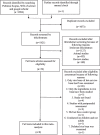The effects of rice bran supplementation for management of blood lipids: A GRADE-assessed systematic review, dose-response meta-analysis, and meta-regression of randomized controlled trials
- PMID: 37046340
- PMCID: PMC10091523
- DOI: 10.1186/s13643-023-02228-y
The effects of rice bran supplementation for management of blood lipids: A GRADE-assessed systematic review, dose-response meta-analysis, and meta-regression of randomized controlled trials
Abstract
Background: We aimed to conduct a systematic review and meta-analysis of randomized controlled trials (RCTs) to investigate the effects of rice bran supplementation on serum lipid profile levels.
Methods: We searched PubMed/Medline, Scopus, ISI Web of Science, and Google Scholar using related keywords. Published RCTs exploring the effects of rice bran consumption on lipid profile were searched up to June 2022. Evidence certainty was assessed on the basis of the Grading of Recommendations, Assessment, Development, and Evaluation (GRADE) approach. The data were pooled using a random-effects model and reported as weighted mean difference (WMD) and 95% confidence interval (CI) for each outcome.
Results: Meta-analysis of eight RCTs (with 11 effect sizes) showed no significant effect of rice bran supplementation on serum levels of triglyceride (WMD: -11.38 mg/dl; 95% CI: -27.73, 4.96; P = 0.17), total cholesterol (WMD: -0.68 mg/dl; 95% CI: -7.25, 5.88; P = 0.834), low-density lipoprotein cholesterol (WMD: -1.68 mg/dl; 95% CI: -8.46, 5.09; P = 0.627) and high-density lipoprotein cholesterol (WMD: 0.16 mg/dl; 95% CI: -1.52, 1.85; P = 0.848) compared to control group.
Conclusion: Our meta-analysis suggests that rice bran supplementation has no significant effects on serum levels of lipid profile components. However, larger studies with longer durations and improved methodological quality are needed before firm conclusions can be reached.
Keywords: Cholesterol; Lipid Profile; Meta-analysis; Rice Bran; Systematic Review; Triglyceride.
© 2023. The Author(s).
Conflict of interest statement
The authors declare no conflict of interest.
Figures
Similar articles
-
The impact of rice bran oil consumption on the serum lipid profile in adults: a systematic review and meta-analysis of randomized controlled trials.Crit Rev Food Sci Nutr. 2022;62(22):6005-6015. doi: 10.1080/10408398.2021.1895062. Epub 2021 Mar 10. Crit Rev Food Sci Nutr. 2022. PMID: 33715544
-
Beneficial effects of folic acid supplementation on lipid markers in adults: A GRADE-assessed systematic review and dose-response meta-analysis of data from 21,787 participants in 34 randomized controlled trials.Crit Rev Food Sci Nutr. 2022;62(30):8435-8453. doi: 10.1080/10408398.2021.1928598. Epub 2021 May 18. Crit Rev Food Sci Nutr. 2022. PMID: 34002661
-
Hesperidin, a major flavonoid in orange juice, might not affect lipid profile and blood pressure: A systematic review and meta-analysis of randomized controlled clinical trials.Phytother Res. 2019 Mar;33(3):534-545. doi: 10.1002/ptr.6264. Epub 2019 Jan 10. Phytother Res. 2019. PMID: 30632207
-
Effects of cardamom supplementation on lipid profile: A systematic review and meta-analysis of randomized controlled clinical trials.Phytother Res. 2020 Mar;34(3):475-485. doi: 10.1002/ptr.6543. Epub 2019 Nov 21. Phytother Res. 2020. PMID: 31755188
-
The effects of green coffee bean extract supplementation on lipid profile in humans: A systematic review and meta-analysis of randomized controlled trials.Nutr Metab Cardiovasc Dis. 2020 Jan 3;30(1):1-10. doi: 10.1016/j.numecd.2019.10.002. Epub 2019 Oct 11. Nutr Metab Cardiovasc Dis. 2020. PMID: 31748178
References
-
- Pirillo A, Casula M, Olmastroni E, Norata GD, Catapano AL. Global epidemiology of dyslipidaemias. Nat Rev Cardiol. 2021;18(10):689–700. - PubMed
-
- Chou R, Dana T, Blazina I, Daeges M, Jeanne TLJJ. Statins for prevention of cardiovascular disease in adults: evidence report and systematic review for the US preventive services task force. JAMA. 2016;316(19):2008–2024. - PubMed
-
- Hammad S, Pu S, Jones PJJL. Current evidence supporting the link between dietary fatty acids and cardiovascular disease. Lipids. 2016;51(5):507–517. - PubMed
Publication types
MeSH terms
Substances
LinkOut - more resources
Full Text Sources


